Punjisil village, in Mujanga Gram Panchayat of Dasmantpur Block, Koraput District, is a tribal settlement reliant on rainfed agriculture, cultivating millets, coffee, vegetables, and paddy. Despite stream-fed irrigation, water scarcity during the Rabi season hampers productivity.
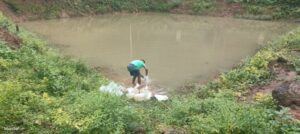 Dora Badanayak exemplifies resilience amid adversity. His farm pond, built two decades ago by the Soil Conservation Department, had silted up, reducing its water capacity. This led to irrigation challenges, resulting in crop failures and financial losses. Last year, he lost half an acre of chili worth ₹5,000 due to water shortages.
Dora Badanayak exemplifies resilience amid adversity. His farm pond, built two decades ago by the Soil Conservation Department, had silted up, reducing its water capacity. This led to irrigation challenges, resulting in crop failures and financial losses. Last year, he lost half an acre of chili worth ₹5,000 due to water shortages.
During the Village Development Plan (VDP) and Participatory Rural Appraisal (PRA) exercises conducted by CYSD, his plight was prioritized. Through community discussions, Dora’s pond was selected for renovation under CYSD’s Parivartan Project, ensuring year-round water availability.
Dora’s farm pond had become nearly obsolete due to heavy silt accumulation, limiting water retention and affecting irrigation during the Rabi season. In the community, only 46 acres of land had access to irrigation, while 135 acres remained entirely dependent on rainfall. This imbalance in water availability posed significant challenges for farmers, limiting their ability to cultivate crops during the dry season and affecting overall agricultural productivity.
In March 2024, the Parivartan Project undertook its renovation to enhance water availability and agricultural resilience. Key steps included de-watering, de-silting to restore storage capacity, embankment dressing to prevent erosion, and grass turfing for sustainability. This intervention revitalized the pond, ensuring reliable irrigation and improving livelihoods for Dora and the broader farming community.
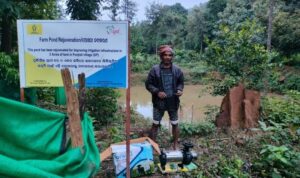 The Parivartan Project enhanced the farm pond renovation by integrating the Integrated Farming System (IFS) model. With support from government departments, Dora diversified his farming practices. The Agriculture Department provided a vermicomposting unit, improving soil fertility, and enabling Dora to plant banana on the bunds to prevent erosion. Fish farming was introduced with the provision of fingerlings, creating an additional income source. Through PMKSY, the Horticulture Department supplied a 1.5 HP submersible pump, ensuring year-round irrigation from the renovated pond and Punjisil stream, sustaining Dora’s 2 acres of farmland during the Rabi and Zaid seasons.
The Parivartan Project enhanced the farm pond renovation by integrating the Integrated Farming System (IFS) model. With support from government departments, Dora diversified his farming practices. The Agriculture Department provided a vermicomposting unit, improving soil fertility, and enabling Dora to plant banana on the bunds to prevent erosion. Fish farming was introduced with the provision of fingerlings, creating an additional income source. Through PMKSY, the Horticulture Department supplied a 1.5 HP submersible pump, ensuring year-round irrigation from the renovated pond and Punjisil stream, sustaining Dora’s 2 acres of farmland during the Rabi and Zaid seasons.
The intervention brought transformative outcomes for Dora’s agriculture and financial stability. The renovated farm pond ensured reliable water availability, reducing crop failure risks. Dora cultivated tomato and chili seedbeds during Rabi, expecting ₹10,000 in income. Fish farming provided an additional revenue stream, while vermiculture and water-efficient irrigation promoted sustainability. This support restored his pond’s functionality, diversified his farming, and improved productivity.
Dora expressed his gratitude, saying, “I am deeply thankful to the CYSD Parivartan team for their invaluable support in overcoming my challenges. With improved water storage, reliable irrigation, and new income opportunities, I now see a secure and prosperous future in sustainable agriculture.”

 I began my journey with CYSD as an intern on 25th September 2024, driven by a desire to explore the social sector. CYSD stood out as an exceptional organization, renowned for its invaluable contributions to social transformation. Operating across multiple thematic areas—livelihoods, child education, women’s empowerment, disaster management, and climate action—it has become a driving force in fostering sustainable development.
I began my journey with CYSD as an intern on 25th September 2024, driven by a desire to explore the social sector. CYSD stood out as an exceptional organization, renowned for its invaluable contributions to social transformation. Operating across multiple thematic areas—livelihoods, child education, women’s empowerment, disaster management, and climate action—it has become a driving force in fostering sustainable development.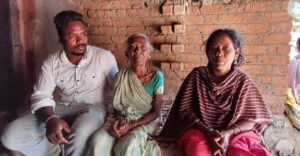 Beyond healthcare, Santosh has helped villagers access government entitlements, such as old age pensions, widow pensions, and labour cards. Recognizing the bureaucratic challenges, he facilitated document verification processes at the Jana Seva Kendra, leveraging his network of local officials and leaders, including the Sarpanch and Gram Rozgar Sahayak (GRS).
Beyond healthcare, Santosh has helped villagers access government entitlements, such as old age pensions, widow pensions, and labour cards. Recognizing the bureaucratic challenges, he facilitated document verification processes at the Jana Seva Kendra, leveraging his network of local officials and leaders, including the Sarpanch and Gram Rozgar Sahayak (GRS). Dora Badanayak exemplifies resilience amid adversity. His farm pond, built two decades ago by the Soil Conservation Department, had silted up, reducing its water capacity. This led to irrigation challenges, resulting in crop failures and financial losses. Last year, he lost half an acre of chili worth ₹5,000 due to water shortages.
Dora Badanayak exemplifies resilience amid adversity. His farm pond, built two decades ago by the Soil Conservation Department, had silted up, reducing its water capacity. This led to irrigation challenges, resulting in crop failures and financial losses. Last year, he lost half an acre of chili worth ₹5,000 due to water shortages. The Parivartan Project enhanced the farm pond renovation by integrating the Integrated Farming System (IFS) model. With support from government departments, Dora diversified his farming practices. The Agriculture Department provided a vermicomposting unit, improving soil fertility, and enabling Dora to plant banana on the bunds to prevent erosion. Fish farming was introduced with the provision of fingerlings, creating an additional income source. Through PMKSY, the Horticulture Department supplied a 1.5 HP submersible pump, ensuring year-round irrigation from the renovated pond and Punjisil stream, sustaining Dora’s 2 acres of farmland during the Rabi and Zaid seasons.
The Parivartan Project enhanced the farm pond renovation by integrating the Integrated Farming System (IFS) model. With support from government departments, Dora diversified his farming practices. The Agriculture Department provided a vermicomposting unit, improving soil fertility, and enabling Dora to plant banana on the bunds to prevent erosion. Fish farming was introduced with the provision of fingerlings, creating an additional income source. Through PMKSY, the Horticulture Department supplied a 1.5 HP submersible pump, ensuring year-round irrigation from the renovated pond and Punjisil stream, sustaining Dora’s 2 acres of farmland during the Rabi and Zaid seasons.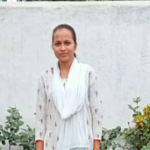 Jemi’s story stands as a testament to the extraordinary power of determination and compassion. Despite financial struggles that forced her to stop her formal education after completing her Plus Two in Science, the 23-year old girl has emerged as a guiding light for over 50 students in her community.
Jemi’s story stands as a testament to the extraordinary power of determination and compassion. Despite financial struggles that forced her to stop her formal education after completing her Plus Two in Science, the 23-year old girl has emerged as a guiding light for over 50 students in her community.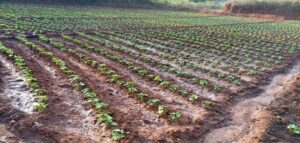 Dhanpati Muduli, a smallholder farmer, faced significant challenges with 0.5 acres of his 3-acre land due to severe undulation and soil erosion, rendering it unfit for cultivation. Previously, this land generated around ₹20,000 annually from millet farming, but middlemen’s low offers and declining productivity forced him to seek alternative incomes, including carpentry.
Dhanpati Muduli, a smallholder farmer, faced significant challenges with 0.5 acres of his 3-acre land due to severe undulation and soil erosion, rendering it unfit for cultivation. Previously, this land generated around ₹20,000 annually from millet farming, but middlemen’s low offers and declining productivity forced him to seek alternative incomes, including carpentry. The Department of Horticulture, Koraput provided 4,20,000 strawberry plants and essential infrastructure, including drip irrigation and mulching, with an investment of approximately ₹1 crore. Irrigation needs were addressed through a combination of solar and electric systems, supported by the Odisha Agro Industries Corporation (OAIC), with a total capacity of 5HP solar and 5HP electric motors. CYSD played a pivotal role in cluster selection, planning, and ongoing monitoring to ensure project success.
The Department of Horticulture, Koraput provided 4,20,000 strawberry plants and essential infrastructure, including drip irrigation and mulching, with an investment of approximately ₹1 crore. Irrigation needs were addressed through a combination of solar and electric systems, supported by the Odisha Agro Industries Corporation (OAIC), with a total capacity of 5HP solar and 5HP electric motors. CYSD played a pivotal role in cluster selection, planning, and ongoing monitoring to ensure project success.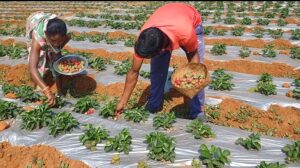 The project’s impact extends well beyond agriculture. Kauguda village has long suffered from poor road connectivity. Frequent visits by government officials, including the Collector and Block Development Officer (BDO), led to the approval and construction of a road, significantly improving accessibility and enhancing the villagers’ quality of life. The initiative also attracted media coverage, amplifying awareness and support for the transformation. This infrastructural development has not only made it easier to transport produce but has also helped improve the overall development of the region.
The project’s impact extends well beyond agriculture. Kauguda village has long suffered from poor road connectivity. Frequent visits by government officials, including the Collector and Block Development Officer (BDO), led to the approval and construction of a road, significantly improving accessibility and enhancing the villagers’ quality of life. The initiative also attracted media coverage, amplifying awareness and support for the transformation. This infrastructural development has not only made it easier to transport produce but has also helped improve the overall development of the region. Key Takeaways:
Key Takeaways: In the village of Patraput, Dunduli Panchayat, Kolnara Block, Rayagada district, 21-year-old Jharana Musuka stands as a beacon of hope and change. A graduate in Sociology, Jharana is a passionate community leader dedicated to improving the lives of those around her.
In the village of Patraput, Dunduli Panchayat, Kolnara Block, Rayagada district, 21-year-old Jharana Musuka stands as a beacon of hope and change. A graduate in Sociology, Jharana is a passionate community leader dedicated to improving the lives of those around her.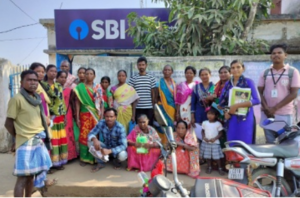 Her dedication extends beyond her village. Jharana supported neighboring villages by accompanying beneficiaries to banks and helping them complete the ABPS conversion. She also volunteered to assist disabled children in applying for disability certificates and pensions, further demonstrating her commitment to inclusivity.
Her dedication extends beyond her village. Jharana supported neighboring villages by accompanying beneficiaries to banks and helping them complete the ABPS conversion. She also volunteered to assist disabled children in applying for disability certificates and pensions, further demonstrating her commitment to inclusivity. Usually, the Matru Committee focuses on addressing malnutrition among children, overseeing the Supplementary Nutrition Programme (SNP), promoting hygiene, and encouraging parents to send children to Anganwadi centers. The Jaanch Committee complements this by monitoring AWC services, supervising food quality, and ensuring eligible beneficiaries receive necessary support. Regular monthly meetings allow members to discuss challenges and allocate tasks.
Usually, the Matru Committee focuses on addressing malnutrition among children, overseeing the Supplementary Nutrition Programme (SNP), promoting hygiene, and encouraging parents to send children to Anganwadi centers. The Jaanch Committee complements this by monitoring AWC services, supervising food quality, and ensuring eligible beneficiaries receive necessary support. Regular monthly meetings allow members to discuss challenges and allocate tasks.